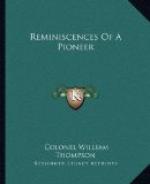I arrived at home after Christmas and during the rest of the winter attended the district school. Had I been told that that little district school was destined to be the last I should ever attend, I possibly should have better applied myself to my studies. I remained on the farm that summer assisting in the general work. In the fall of 1862, Joaquin Miller and Anthony Noltner started the “Herald,” a weekly newspaper, at Eugene City. Instead of going to school, as my father wished, I applied for and obtained a position as “devil” in the office. Mr. Noltner was of the opinion that the name was very appropriate in my case. However, I soon gained the confidence and esteem of my employers. As evidence of this, I remained three years, and during the time did not lose three days, that is, if we except the several occasions when for a week or two, the Herald was “excluded from the United States mails for disloyal utterances.” Publication would be suspended for a week or so and then come out under another name. The columns would be filled with news and “strictly literary matter” for a short time. Then Mr. Miller would launch out and give expression to his opinion on things in general and certain politicians in particular. After a few weeks something said would incur the displeasure of the postmaster, and we would then have to begin all over under a new name. And do you know, I grieve to admit it now, but those little vacations came so regularly that I began to enjoy them—I could go hunting.
Thus Miller and Noltner struggled along, issuing their publication under three or four different names. There was talk at different times of providing Mr. Miller a residence at Fort Alcatraz, with board and lodging at the expense of the U. S. Government. Now, I may be “telling tales out of school” but there are few left to care, save Mr. Miller and the writer, and I trust that “Heinie” will pardon me in thus living over the stirring times of our youth.
In the spring of 1864, I think it was, Mr. Miller sold his interest in the paper to his partner, Mr. Noltner. After that the office had few charms for me, and more and more my spirits bent to a “Call to the Wild.” This feeling became the more pronounced by reason of a little misunderstanding with Major Rinehart who commanded the troops at that time stationed at Eugene City. The circumstances leading up to the “misunderstanding,” briefly are that a friend, Henry Mulkey, had been arrested for a political offense by order of Major Rinehart, and it had been determined to send him to Ft. Vancouver and possibly to Alcatraz. I went to Major Rinehart’s headquarters and applied for a pass to see Mr. Mulkey. That I played good-goody—lied like a tombstone in order to get the pass, is not necessary here to state, but I got it and arranged an escape with Mulkey. That the arrangement miscarried was due to Mr. Mulkey, and not to the prudence of Major Rinehart or the failure upon my part to carry out the program.




